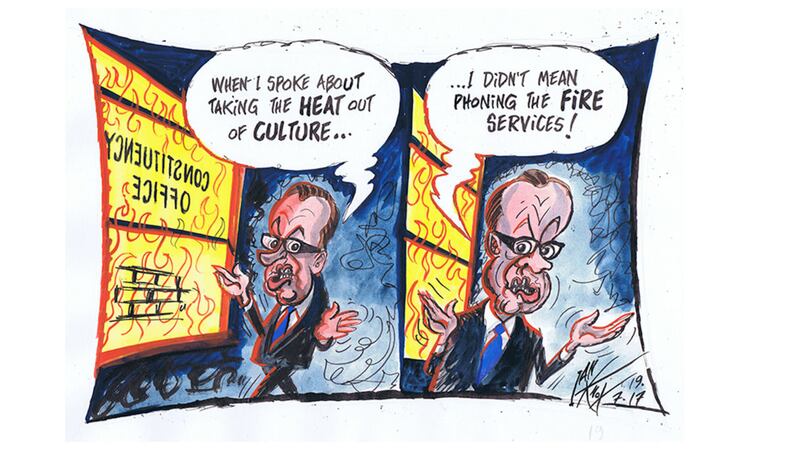At 7pm on the 12th of July Belfast city centre resembled a scene from a zombie movie.
The shops, bars and cafes were closed. The streets were eerily deserted.
The traffic lights flickered from red, amber to green but there was no traffic flowing.
In the distance, blue flashing lights warned of danger while police officers redirected the few cars that ventured near the city centre.
Small clusters of bedraggled people, some pushing children in buggies, shuffled along the streets – some veered onto the normally busy roads and staggered back to the cluster.
Outside the Grand Opera House a bevy of half-dressed males lay strewn on the ground clutching various bottles of alcohol which they swigged from. The streets were littered with the remnants of what you would expect to find after such a jamboree.
The union jack was loudly on display on those who staggered along: as a flag, a body warmer, a dress, shorts, t-shirts, sun-shades – any commodity to serve as a patriotic emblem, however inappropriate.
This was the scene that greeted our eyes, Seanadoír Niall Ó Donnghaile and me, as I tried in vain to drive Niall to his home in Belfast’s Short Strand after a busy few days in the Seanad in Dublin. Not for the first time a Short Strand resident was inconvenienced by a passing Orange parade.
I wonder how much revenue was lost to the businesses of Belfast’s city centre for the privilege of hosting the Orange Order on the glorious 12th.
That said it was the most peaceful 12th of July for decades and for all those involved in making it so they have our thanks and appreciation.
The quiet and protracted dialogue that made that peace possible must now be employed to ensure that Eleventh Night bonfires do not replace Orange Order marches as the new battle-ground for intolerance and sectarian spite by those trying to defend the indefensible.
It was welcome to hear Arlene Foster’s condemnation of effigy and poster burning on bonfires, including the image of the late Martin McGuinness, and the location and size of others, which in the case of one bonfire, close to Belfast’s Sandy Row, was life-threatening and dangerous for the residents of a block of flats.
And while the news over the past week from the north has been dominated by events from 17th century Europe the rest of Ireland, and indeed Britain, continue to grapple with the consequences of Europe in this century, in particular Brexit.
The Seanad debated and endorsed a report by a select committee on the potential economic impact of Brexit on the Irish economy and at the Garage Theatre in Monaghan on Friday night the Border Communities Against Brexit were the recipients of a prestigious award, the ‘European Citizen Prize’.
It is annually presented to groups and people by the EU in recognition of an outstanding achievement.
In this instance, the appropriate accolade was for a group who have championed the cause of the people of this nation by focusing in on the dire economic and social consequences of Brexit on the people who live along the border corridor.
Their anxieties were reflected in the Seanad’s report which microscopically examines current trade and commerce relationships within this island, between here and Britain and the EU.
The report identified four areas of concern and at most risk due to Brexit: trade, foreign direct investment, energy and migration.
It examines the trade interface between business Ireland and business Britain and the likely consequences of Brexit on the free movement of people, goods, services and capital between both countries.
In offering a solution the report casts its net very widely indeed suggesting almost 100 solutions – a solution to every possible problem posed.
But its primary solution is that the north be afforded special status to remain inside the EU with the rest of Ireland.
The significance of the Seanad’s report and the gathering in the Garage Theatre is that both had the support of all parties represented in the Oireachtas.
This is the correct approach in dealing with what is a national emergency.
And it needs to be the approach in dealing with a plan to end partition and reunite this country. A long-standing national emergency.








